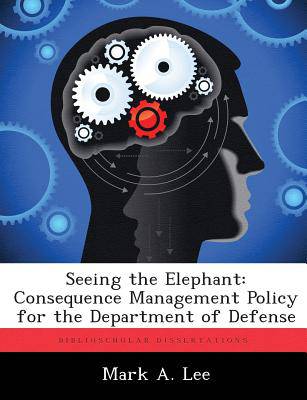
Door een staking bij bpost kan je online bestelling op dit moment iets langer onderweg zijn dan voorzien. Dringend iets nodig? Onze winkels ontvangen jou met open armen!
- Afhalen na 1 uur in een winkel met voorraad
- Gratis thuislevering in België vanaf € 30
- Ruim aanbod met 7 miljoen producten
Door een staking bij bpost kan je online bestelling op dit moment iets langer onderweg zijn dan voorzien. Dringend iets nodig? Onze winkels ontvangen jou met open armen!
- Afhalen na 1 uur in een winkel met voorraad
- Gratis thuislevering in België vanaf € 30
- Ruim aanbod met 7 miljoen producten
Zoeken
Seeing the Elephant
Consequence Management Policy for the Department of Defense
Mark A Lee
Paperback | Engels
€ 54,45
+ 108 punten
Omschrijving
Consequence Management is a complex problem facing the US today. A subset of Homeland Security, Consequence Management is the post attack actions needed to prevent further suffering and restore basic government services. Consequence Management requires a symphony of effort from many federal agencies, including the Department of Defense. Because organizations are driving their actions based on misperceptions gleaned from the 1996 Sarin attack in Tokyo, many are moving in divergent directions. These divergent programs are often competing for the same resources, and siphon these resources away from the local response community. This monograph explores these common misperceptions and recommends a new direction, closer to the required capabilities, for the Department of Defense role in Consequence Management. The monograph recommends the elimination of specialized units for WMD response. An honest assessment of the time element of an event shows the folly of this approach. The second recommendation is the creation of a tiered response capability that balances time and tasks required for effective Consequence Management. The three response tiers allows the DoD to provide a predesignated level of support to the appropriate Federal and state agency. The first two tiers address the response required for toxic chemical events. The third tier is reserved for the actions required for the Consequence Management for a biological release.
Specificaties
Betrokkenen
- Auteur(s):
- Uitgeverij:
Inhoud
- Aantal bladzijden:
- 54
- Taal:
- Engels
Eigenschappen
- Productcode (EAN):
- 9781288317981
- Verschijningsdatum:
- 19/11/2012
- Uitvoering:
- Paperback
- Formaat:
- Trade paperback (VS)
- Afmetingen:
- 189 mm x 246 mm
- Gewicht:
- 113 g

Alleen bij Standaard Boekhandel
+ 108 punten op je klantenkaart van Standaard Boekhandel
Beoordelingen
We publiceren alleen reviews die voldoen aan de voorwaarden voor reviews. Bekijk onze voorwaarden voor reviews.











